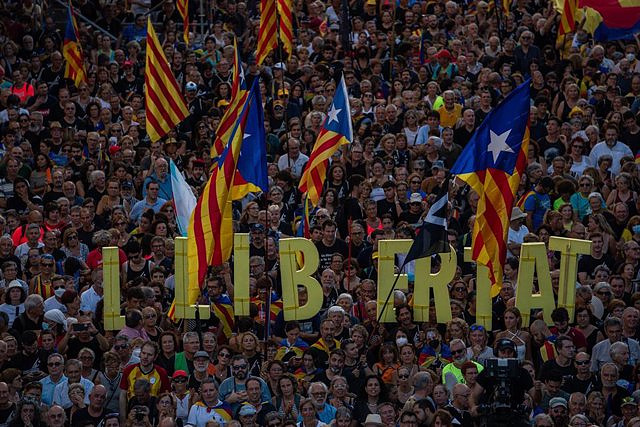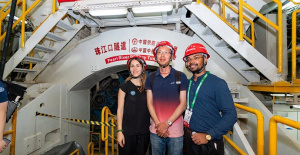Aragonès will go to the ANC demonstration after being absent last year
BARCELONA, 11 Sep. (EUROPA PRESS) -
The independence movement arrives at the September 11 Day this Monday with the amnesty at the center of the debate and as a condition for a hypothetical investiture of the socialist candidate and acting president, Pedro Sánchez, after electoral results that gave ERC and Junts the key to facilitate a PSOE and Sumar government.
In fact, in his speech this Saturday night on the occasion of the Diada, the president of the Generalitat, Pere Aragonès, stated that the amnesty "by itself does not resolve the conflict of sovereignty with the State" and that this conflict it will exist until Catalonia has a referendum.
Aragonès has said that the amnesty is the "guarantee that no one else will go to prison and that the exiles will return free", in the institutional message that the Government has dedicated to the Catalan language and that he has delivered from the headquarters of the Institute of Catalan Studies (IEC).
"We are forcing the State Government to take decisive steps for the amnesty. To assume it as essential and inevitable," he claimed.
He has said that the way forward is to be firm, negotiate and dialogue "to definitively overcome the repression" and lay the foundations so that Catalans can vote on their political future in a referendum, according to him.
This year's Diada will begin with the traditional offering to the Rafael Casanova monument in Barcelona, in which parties and institutions will participate, and in the afternoon the independence movement will meet at the demonstration organized by the ANC in Barcelona.
Under the slogan 'Via fora' - a cry of alarm in medieval Catalonia - the demonstration will start at 5:14 p.m. from four columns that will leave Ciutat de la Justice, Escola Proa, Estació de Sants and Plaza Letamendi, and they will converge in Plaza España.
Coinciding with this year's Day, the ANC, Omnium Cultural, the Council of the Republic (CdRep), the Association of Municipalities for Independence (AMI) and the Intersindical-CSC have also promoted a "national pact for the civil movement for independence" to which up to 15 entities have joined.
The holding of a referendum will foreseeably be one of the central demands of the independence movement during the Diada, and it is also one of the requests that Junts and ERC have put on the table in the negotiation of the investiture.
In fact, the Republicans have already warned the PSOE that an amnesty law will not be enough for them to count on their votes, and they insist that they must continue taking steps "in the recognition of self-determination."
Puigdemont also warned, after establishing his conditions for negotiating - among them amnesty, mediation and "legitimizing" the independence movement - that the success of the talks would depend, in part, on progress in the self-determination portfolio.
Until now, the PSC had refused both an amnesty and a referendum; In their latest statements, socialist leaders have stressed that their framework for negotiating is the Constitution: "Prudence, patience, discretion and the Constitution," summed up the leader of the PSC, Salvador Illa.
For his part, Aragonès has already confirmed that he will attend the ANC demonstration this year, as will other members of ERC, Junts, the CUP and entities such as Òmnium and the AMI.
Last year, neither Aragonès nor any ERC member of the then coalition Government with Junts attended the demonstration, considering that it was not inclusive and went against the Catalan institutions.
The then councilors of Junts did attend, who weeks later left the Government due to their differences with ERC over the dialogue with the Government, from which reforms such as the repeal of sedition and the modification of the crime of embezzlement have emerged in the last year.
After Puigdemont set out his conditions for negotiating with the PSOE this week, ERC has celebrated that Junts is now joining the "way of negotiation", and has once again called for more coordination between the pro-independence forces.
In this scenario, it remains to be seen if the independence movement manages to stage its unity in the ANC demonstration - which last year brought together 150,000 people - and in the rest of the events organized by pro-independence entities.
Last year, ERC leaders were booed during an early morning event at the Fossar de les Moreres, a historical enclave that commemorates the taking of Barcelona by Bourbon troops on September 11, 1714 during the War of Succession.
Precisely, one of the most critical voices of the Government in the last Diada was the president of the ANC, Dolors Feliu, who urged the Catalan Executive to either declare independence or dissolve the Chamber: "Either independence, or elections," she said.
Days later, the ANC launched a round of meetings in which it asked the Catalan leaders for a Unilateral Declaration of Independence (DUI) at the end of 2023 and to abandon the negotiation with the State.
On the eve of the Diada, Feliu has rescued this petition to ask the ERC Government to activate the DUI "the day after" the amnesty law is approved, to which the ERC Executive has reaffirmed its negotiating commitment.
Òmnium and ERC will hold their own events to celebrate the Diada, while the CUP and the rest of the entities of the Independentist Left have called for demonstrations throughout Catalonia - in Barcelona, it starts at 6:00 p.m. from Plaza Urquinaona.
For their part, the CDRs will be added to the column of the ANC demonstration that leaves the City of Justice.
The ANC will also organize political, cultural and social events for the Day in France, Luxembourg, England, Germany, Brussels, the Netherlands, Ireland, Mexico and the United States.
In Luxembourg, the ANC has organized a conference on Monday where "the amnesty and its possible consequences for the independence movement will be discussed"; and in England, a vermouth was held this Saturday to inaugurate the Diada with a debate on the present and future of the independence movement with the coordinator Uriel Bertran and performances by the 'castellers' from London and the Catalan choir.
The ANC foreign assembly in Mexico prepared a round table for this Sunday on minority languages and in the United States it has organized meetings in cities such as Dallas, Minneapolis or Washington.
To close the day, the Government has organized a show dedicated to the language to be held at the Fonts de Montjuïc in which Catalan-speaking artists, the Galician singer Luz Casal, eight choirs and the Ballet of Catalonia will participate.
In addition to representatives of the Catalan institutions, the president of the Congress, Francina Armengol, is expected to attend, who will attend all the institutional events on the official days of the autonomous communities.
This year, the celebration of the Diada coincides with the tribute to the 50th anniversary of the death of Salvador Allende and the coup d'état in Chile, which will be commemorated in an event in Barcelona that is expected to be attended by leaders of several political parties.

 Exploring Cardano: Inner Workings and Advantages of this Cryptocurrency
Exploring Cardano: Inner Workings and Advantages of this Cryptocurrency Seville.- Economy.- Innova.- STSA inaugurates its new painting and sealing hangar in San Pablo, for 18 million
Seville.- Economy.- Innova.- STSA inaugurates its new painting and sealing hangar in San Pablo, for 18 million Innova.- More than 300 volunteers join the Andalucía Compromiso Digital network in one month to facilitate access to ICT
Innova.- More than 300 volunteers join the Andalucía Compromiso Digital network in one month to facilitate access to ICT Innova.-AMP.- Ayesa acquires 51% of Sadiel, which will create new technological engineering products and expand markets
Innova.-AMP.- Ayesa acquires 51% of Sadiel, which will create new technological engineering products and expand markets Unicaja lifts its first FIBA Champions League at the expense of Lenovo Tenerife
Unicaja lifts its first FIBA Champions League at the expense of Lenovo Tenerife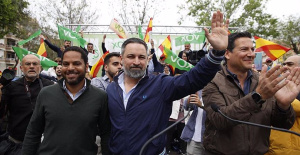 Abascal (Vox) criticizes that Sánchez is "victimizing" himself and calls for elections after his possible resignation
Abascal (Vox) criticizes that Sánchez is "victimizing" himself and calls for elections after his possible resignation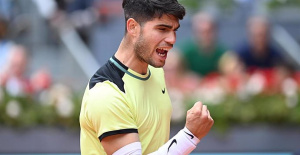 Carlos Alcaraz reaches the round of 16 in Madrid without breaking a sweat
Carlos Alcaraz reaches the round of 16 in Madrid without breaking a sweat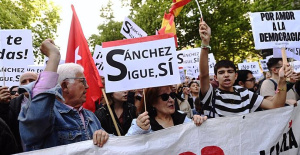 Some 5,000 people demonstrate in front of Congress for democracy, hours before Sánchez's decision
Some 5,000 people demonstrate in front of Congress for democracy, hours before Sánchez's decision How Blockchain in being used to shape the future
How Blockchain in being used to shape the future Not just BTC and ETH: Here Are Some More Interesting Coins Worth Focusing on
Not just BTC and ETH: Here Are Some More Interesting Coins Worth Focusing on UPV students build a prototype of a wooden house to move to Equatorial Guinea
UPV students build a prototype of a wooden house to move to Equatorial Guinea The UA opens the call for the Impulso 2024 Awards for the best innovative business initiatives
The UA opens the call for the Impulso 2024 Awards for the best innovative business initiatives ALI, virtual assistant from Alicante, internationally recognized by the OECD
ALI, virtual assistant from Alicante, internationally recognized by the OECD Retrópolis brings the golden age of video games and computing to the UPV
Retrópolis brings the golden age of video games and computing to the UPV A million people demonstrate in France against Macron's pension reform
A million people demonstrate in France against Macron's pension reform Russia launches several missiles against "critical infrastructure" in the city of Zaporizhia
Russia launches several missiles against "critical infrastructure" in the city of Zaporizhia A "procession" remembers the dead of the Calabria shipwreck as bodies continue to wash up on the shore
A "procession" remembers the dead of the Calabria shipwreck as bodies continue to wash up on the shore Prison sentences handed down for three prominent Hong Kong pro-democracy activists
Prison sentences handed down for three prominent Hong Kong pro-democracy activists ETH continues to leave trading platforms, Ethereum balance on exchanges lowest in 3 years
ETH continues to leave trading platforms, Ethereum balance on exchanges lowest in 3 years Investors invest $450 million in Consensys, Ethereum incubator now valued at $7 billion
Investors invest $450 million in Consensys, Ethereum incubator now valued at $7 billion Alchemy Integrates Ethereum L2 Product Starknet to Enhance Web3 Scalability at a Price 100x Lower Than L1 Fees
Alchemy Integrates Ethereum L2 Product Starknet to Enhance Web3 Scalability at a Price 100x Lower Than L1 Fees Mining Report: Bitcoin's Electricity Consumption Declines by 25% in Q1 2022
Mining Report: Bitcoin's Electricity Consumption Declines by 25% in Q1 2022 Oil-to-Bitcoin Mining Firm Crusoe Energy Systems Raised $505 Million
Oil-to-Bitcoin Mining Firm Crusoe Energy Systems Raised $505 Million Microbt reveals the latest Bitcoin mining rigs -- Machines produce up to 126 TH/s with custom 5nm chip design
Microbt reveals the latest Bitcoin mining rigs -- Machines produce up to 126 TH/s with custom 5nm chip design Bitcoin's Mining Difficulty Hits a Lifetime High, With More Than 90% of BTC Supply Issued
Bitcoin's Mining Difficulty Hits a Lifetime High, With More Than 90% of BTC Supply Issued The Biggest Movers are Near, EOS, and RUNE during Friday's Selloff
The Biggest Movers are Near, EOS, and RUNE during Friday's Selloff Global Markets Spooked by a Hawkish Fed and Covid, Stocks and Crypto Gain After Musk Buys Twitter
Global Markets Spooked by a Hawkish Fed and Covid, Stocks and Crypto Gain After Musk Buys Twitter Bitso to offset carbon emissions from the Trading Platform's ERC20, ETH, and BTC Transactions
Bitso to offset carbon emissions from the Trading Platform's ERC20, ETH, and BTC Transactions Draftkings Announces 2022 College Hoops NFT Selection for March Madness
Draftkings Announces 2022 College Hoops NFT Selection for March Madness